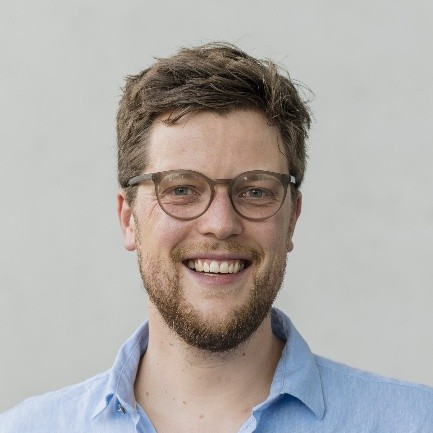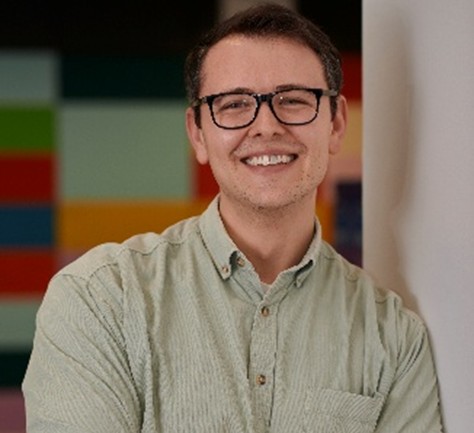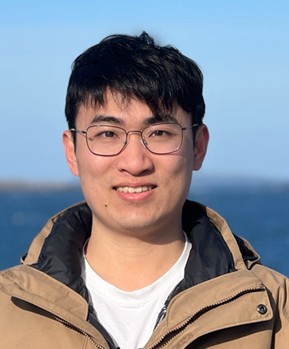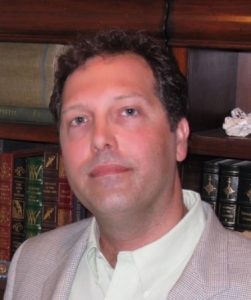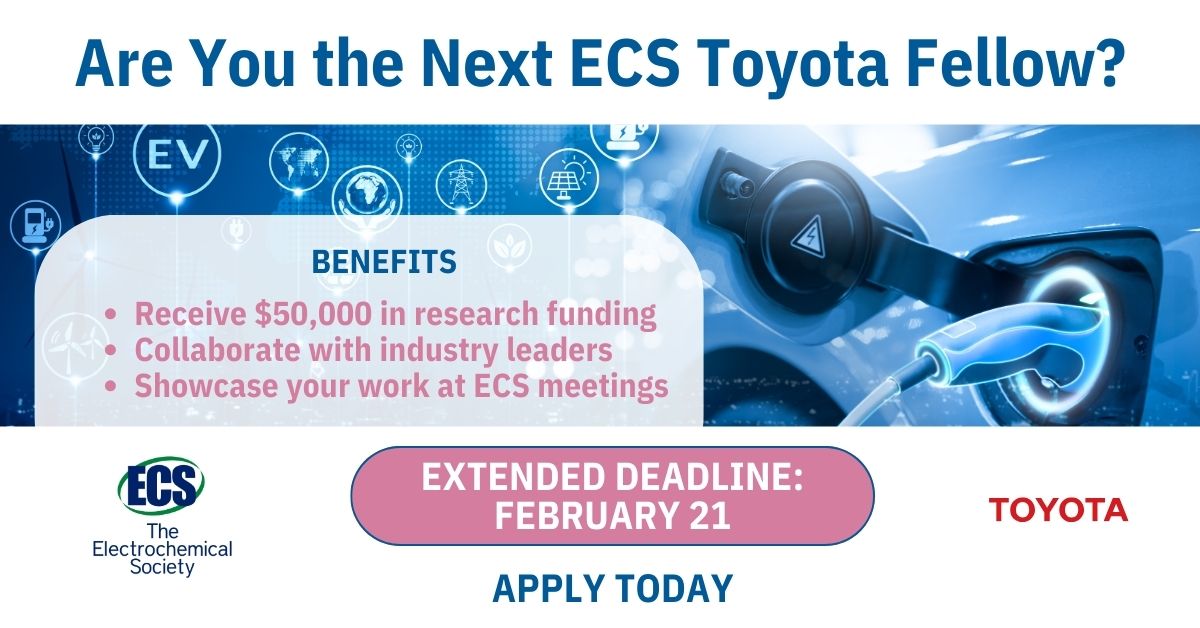Presenters: Lennart Reuter and Leonhard J. Reinschlüssel
Technische Universität München (TUM)
Date: August 6, 2025
Time: 1000-1100h ET
ECSA Spotlight: Exploring the Future of Electrodeposition with Deep Eutectic Solvents
Posted on June 19, 2025 by Adrian Plummer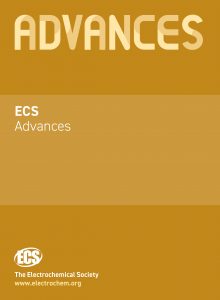 ECS Advances is proud to spotlight the article, “Challenges to the Adoption of Deep Eutectic Solvents in the Electrodeposition Industries,” by T. A. Green and S. Roy of the Department of Chemical and Process Engineering at the University of Strathclyde, Glasgow, UK. This thought-provoking contribution critically examines the barriers to widespread industrial adoption of deep eutectic solvents (DESs) in electrodeposition processes, an emerging area of great interest for sustainable electrochemical manufacturing.
ECS Advances is proud to spotlight the article, “Challenges to the Adoption of Deep Eutectic Solvents in the Electrodeposition Industries,” by T. A. Green and S. Roy of the Department of Chemical and Process Engineering at the University of Strathclyde, Glasgow, UK. This thought-provoking contribution critically examines the barriers to widespread industrial adoption of deep eutectic solvents (DESs) in electrodeposition processes, an emerging area of great interest for sustainable electrochemical manufacturing.
The authors provide a comprehensive overview of the scientific, technical, and regulatory challenges impeding the transition from traditional electrolytes to DESs, while also offering valuable insights into future research directions that could unlock DESs’ full potential. Their work serves as a crucial reference for researchers, industry professionals, and policymakers aiming to advance green electrochemistry. (more…)
ECS Detroit Section Hosts Intro to Electric Vehicles for American Low-carbon Living (EVs4ALL)
Posted on June 6, 2025 by Maggie HohenadelRegister for June 16 seminar
 The ECS Detroit Section invites you to register for “ARPA-E EVs4ALL – Introduction of a current Initiative of the U.S. Department of Energy” on June 16 at Nissan Technical Center North America.
The ECS Detroit Section invites you to register for “ARPA-E EVs4ALL – Introduction of a current Initiative of the U.S. Department of Energy” on June 16 at Nissan Technical Center North America.
Program Performers presenting at the event are from ARPA-E, University of Maryland, Zeta Energy Corp, Ohio State University, and Tyfast.
Pre-registration by June 14 is required.
Dr. Kent Zheng, Assistant Professor in the McKetta Department of Chemical Engineering at The University of Texas at Austin, is making significant strides in electrochemical research and editorial leadership. Since joining UT Austin in early 2024, he has been at the forefront of developing sustainable battery technologies, focusing on lithium-free systems utilizing zinc and aluminum, and exploring iron-based materials with water-based electrolytes to promote environmental sustainability.
In addition to his research endeavors, Dr. Zheng serves as an Associate Editor for The Electrochemical Society (ECS) journal ECS Advances, where he contributes to shaping the future of electrochemical science publishing. His editorial insights and vision for the journal were recently highlighted in an interview with the ECS Advances editorial team. (https://iopscience.iop.org/article/10.1149/2.F05251IF) (more…)
ECS Detroit Section Hosts “Lithium Metal Battery Leaders”
Posted on April 14, 2025 by Maggie HohenadelRegister for April 23 event
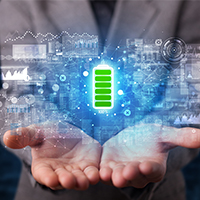 The ECS Detroit Section invites you to “Lithium Metal Battery Leaders” with speakers from Factorial, Lyten, SAFT, University of Texas at Austin, and Sepion Technologies, on April 23 at Mercedes-Benz Research & Development North America, Inc.
The ECS Detroit Section invites you to “Lithium Metal Battery Leaders” with speakers from Factorial, Lyten, SAFT, University of Texas at Austin, and Sepion Technologies, on April 23 at Mercedes-Benz Research & Development North America, Inc.
Pre-registration required by Tuesday, April 22, 2025
ECS Detroit Section Hosts “Detecting Internal Short Circuit in Li-ion Cells with Sahraei Failure Model”
Posted on March 25, 2025 by Maggie HohenadelRegister for Elham Sahraei’s April 7 seminar
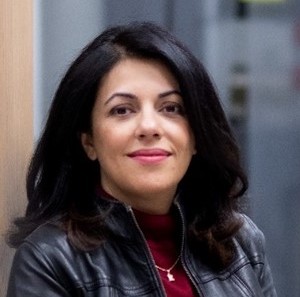 The ECS Detroit Section invites you to “Detecting Internal Short Circuit in Li-ion Cells with Sahraei Failure Model” on April 7, presented by Elham Sahraei, Professor and Director of the Electric Vehicle Safety Lab, Temple University, at Mercedes-Benz Research & Development North America, Inc.
The ECS Detroit Section invites you to “Detecting Internal Short Circuit in Li-ion Cells with Sahraei Failure Model” on April 7, presented by Elham Sahraei, Professor and Director of the Electric Vehicle Safety Lab, Temple University, at Mercedes-Benz Research & Development North America, Inc.
Pre-registration required by Sunday, April 6, 2025
ECS Detroit Section Hosts “Design Characteristics of High-Power Vs. High Energy Batteries”
Posted on March 5, 2025 by Maggie HohenadelRegister for William Mays’ March 12 seminar
The ECS Detroit Section invites you to “Design Characteristics of High-Power Vs. High Energy Batteries” presented by William Mays, BASF Battery Materials Technical Account Manager, on March 12 at Mercedes-Benz Research & Development North America, Inc.
Pre-registration is required.
Registration deadline: Tuesday, March 11, 2025
Deadline Extended: Apply Now for the ECS Toyota Young Investigator Fellowship!
Posted on January 31, 2025 by Shannon ReedAre you working on groundbreaking research in green energy technologies? There’s great news for innovators and researchers passionate about sustainable solutions—the deadline for the ECS Toyota Young Investigator Fellowship has been extended to February 21, 2025!
This prestigious fellowship, a partnership between Toyota Research Institute of North America and The Electrochemical Society (ECS), offers a minimum $50,000 fellowship to support innovative research in batteries, fuel cells, hydrogen, and other sustainable energy technologies. The opportunity is open to applications from individuals working in Europe, Canada, Mexico, and the US.
Why apply for the ECS Toyota Young Investigator Fellowship?
ECS Detroit Section Hosts “Composites from Aramid Nanofibers for Batteries”
Posted on January 22, 2025 by Maggie HohenadelRegister for January 30 seminar presented by Nicholas A. Kotov
 The ECS Detroit Section invites you to “Composites from Aramid Nanofibers for Batteries” presented by Nicholas A. Kotov (University of Michigan) on January 31 at Mercedes-Benz Research & Development North America, Inc.
The ECS Detroit Section invites you to “Composites from Aramid Nanofibers for Batteries” presented by Nicholas A. Kotov (University of Michigan) on January 31 at Mercedes-Benz Research & Development North America, Inc.
Dr. Kotov is the Joseph B. and Florence V. Cejka Professor of Chemical Engineering at the University of Michigan. He has appointments in chemical engineering, biomedical engineering, materials science and engineering, macromolecular science and engineering, and the Biointerfaces Institute.
Pre-registration is required.
Registration deadline: Tuesday, January 28, 2025
Call for Nominations: Two JSS Technical Editor Opportunities
Posted on January 13, 2025 by Adrian Plummer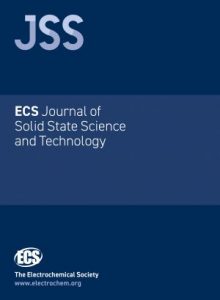 The ECS Journal of Solid State Science and Technology (JSS) (JSS) welcomes nominations for the role of Technical Editor in the topical interest areas of Carbon Nanostructures and and Materials and Processing. These vital editorial roles are integral to maintaining the journal’s high standards of scientific excellence and ensuring the success of its publication efforts.
The ECS Journal of Solid State Science and Technology (JSS) (JSS) welcomes nominations for the role of Technical Editor in the topical interest areas of Carbon Nanostructures and and Materials and Processing. These vital editorial roles are integral to maintaining the journal’s high standards of scientific excellence and ensuring the success of its publication efforts.
Scope of the roles
Carbon Nanostructures and Devices
Areas of interest include design and growth of conducting, semiconducting, and insulating carbon nanostructures including nanocarbons, nanotubes, graphene, and fullerenes. Specific topics include theoretical and experimental studies on nanotubes, graphene, and fullerenes for use in energy, catalytic, and sensor applications; electronic, photonic, electrochemical, and mechanical devices; functional materials, and chemical and physical functionalization of carbon nanostructures; supramolecular assemblies; biomedical devices; and environmental remediation. (more…)


